ISLAMABAD: Pakistan’s 46th National Rehmatul Lil Aalameen Conference kicked off in the federal capital today, Monday, as part of celebrations for the upcoming Mawlid Al-Nabi, the birth day of Prophet Muhammad (PBUH).
Rabi Al-Awwal is the third month in the Islamic calendar. The month holds special significance for Muslims around the world as they observe the 12th of the month as Mawlid Al-Nabi, the birth day of Prophet Muhammad (PBUH).
Last week, Prime Minister urged the nation to celebrate next week’s birth anniversary in an “unprecedented manner” this year.
“The two-day conference titled ‘Role of Masjid, Madaris, Khanqas and Imambargahs for the promotion of unity and harmony in the light of teachings of the Holy Prophet (PBUH),’ would conclude on Tuesday,” state-run APP news agency said on Monday. “National Assembly Speaker Asad Qaiser would be the chief guest on the inaugural day of the conference.”
The second day, Tuesday, would have sessions presided over by President Dr Arif Alvi and PM Khan.
The conference has been held as the annual event of the Ministry of Religious Affairs and Interfaith Harmony since 1976.
“The conference aimed at highlighting the soft image of Islam would disseminate the teachings of the Holy Prophet Muhammad (Peace be Upon Him) and also encourage the [Muslim] authors by giving them awards on outstanding books and research papers written on the life of the Holy Prophet (PBUH),” APP said.
“People from all walks of life, including Parliamentarians, ambassadors, Ulema, scholars, students of religious seminaries, universities, deans of universities and representatives of chambers of commerce and industry will attend the moot.”
Pakistan’s religion ministry holds annual conference with focus on ‘promotion of unity’
https://arab.news/brce9
Pakistan’s religion ministry holds annual conference with focus on ‘promotion of unity’
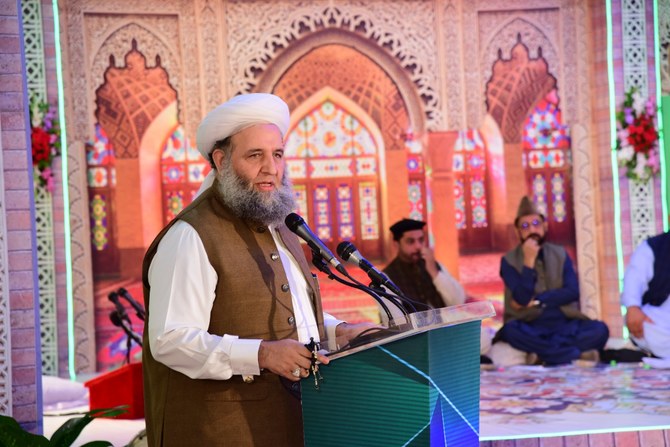
- Conference is part of celebrations for Mawlid Al-Nabi, the birth day of Prophet Muhammad (PBUH)
- The conference has been held annually by Ministry of Religious Affairs since 1976
Pakistan to train 1 million youth annually to export skilled human resource to Gulf countries
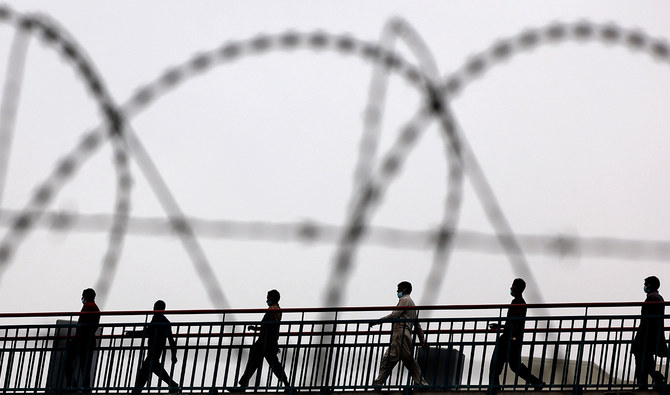
- Islamabad is planning to roll out a new education policy next month, with a focus on vocational training and out-of-school children
- Educationists, however, say the real challenge for the government is to ensure implementation of the policy, focus on teacher training
ISLAMABAD: Pakistan’s government is working on a new education policy to impart technical skills to one million youth annually to export trained human resource to Saudi Arabia and other Gulf countries, an official said on Friday.
The cash-strapped South Asian nation of 241 million has been working on a holistic national education policy to cover technical training for the youth by enrolling over 2.5 million out-of-school children.
The Special Investment Facilitation Council (SIFC), a federal body led by Prime Minister Shehbaz Sharif to attract investment from foreign and domestic sources, has given specific targets to the education ministry to finalize a comprehensive policy to improve the education sector.
“This new policy aims to impart vocational training to at least one million youth per annum to export skilled workforce to Saudi Arabia and other Gulf countries,” Rana Mujtaba, a spokesperson for the Pakistani ministry of education and professional training, told Arab News.
“It will be rolled out in May.”
There are around 9 million overseas Pakistanis living and working in different countries, including 2.8 million in Saudi Arabia, who remit around $30 billion back home annually to support the country’s fragile economy.
“Majority of our overseas workforce is unskilled labor. Therefore, the government is now focusing on enhancing vocational capacity of the youth,” Mujtaba said.
In the National Education Policy 2017-2025, Pakistan aimed to raise its literacy rate from the existing 60 percent to 90 percent by 2025, narrow down the gender gaps, reduce rural and urban imbalance, improve quality of education, promote technical and vocational education with skill development programs, and ensure good governance. But all this has yet to be achieved.
Mujtaba said Pakistan’s vocational training institutes already had a “strong affiliation” with Saudi Arabia, where all training certificates were accepted.
“The SIFC that is chaired by the PM has given a general direction to the ministry to work on a new education policy to improve the sector’s performance,” he said.
The spokesperson dispelled the notion that the education ministry was working on the new education policy without taking provincial governments on-board, since education has primarily been a provincial subject in the South Asian country.
“The federal government is in fact supporting the provinces in improving the education sector. All provincial ministers and education secretaries are on-board as the federal ministry has sought inputs from all of them,” he said.
“This will be a holistic policy that will also address the issue of out-of-school children, improving the higher education’s standards, domestic and foreign scholarships for the students.”
Educationists and public policy experts said the government had already devised numerous policies and produced documents to improve the education sector, but it would lack in implementation of these plans.
“The silver lining in the new policy is that the government is for the first time focusing on out-of-school children, but there needs to be an effective mechanism in place with clear timelines to address this issue,” Taimur Bandey, an educationist, told Arab News.
“The government needs to allocate its resources for teachers training and upgrade libraries and laboratories in the institutions to improve the education standards.”
Pakistani PM orders authorities to expedite anti-smuggling operations amid economic crisis
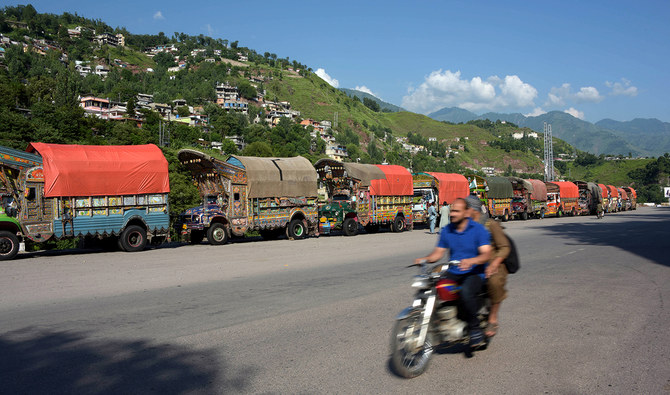
- PM Sharif chairs high-level meeting to review progress on countrywide anti-smuggling measures
- Orders effective monitoring of the Afghan transit trade, action against smugglers and hoarders
ISLAMABAD: Prime Minister Shehbaz Sharif ordered law enforcement agencies to expedite Pakistan’s nationwide anti-smuggling campaign, state-run media reported this week, as Islamabad tries to navigate a tricky path to economic recovery.
Pakistan’s caretaker administration announced a countrywide crackdown against smuggling and black marketing in September 2023 as the South Asian country reeled from an economic crisis that has seen its foreign exchange reserves plummet, currency devaluate sharply and inflation rise to record highs.
PM Sharif’s government has vowed to continue the country’s anti-smuggling operations to ensure Pakistan makes steady economic progress.
“Prime Minister Muhammad Shehbaz Sharif has directed the law enforcement agencies to expedite the countrywide anti-smuggling campaign,” the state-run Radio Pakistan reported on Friday. It said the development took place during a high-level meeting chaired by Sharif in Islamabad on Friday to review the anti-smuggling operations in the country.
In October last year, Pakistan imposed a 10 percent processing fee on several items imported from Afghanistan under a transit trade agreement to stop the illegal entry of goods from the country. In the meeting on Friday, Sharif ordered authorities to ensure effective monitoring of the Afghan transit trade items to prevent their smuggling.
“He directed the customs authorities to conduct a third-party audit of the system that monitors Afghan transit trade,” state-run media said.
Authorities told Sharif during the meeting that a list of smugglers, hoarders and their facilitators has been prepared and provided to law enforcement agencies and provinces.
The Pakistani prime minister appreciated law enforcement agencies for taking effective action against smuggling and ordered authorities to enhance cooperation to crack down on the illegal activities.
Pakistan urges climate change collaboration with UAE after record rains hit Gulf nation
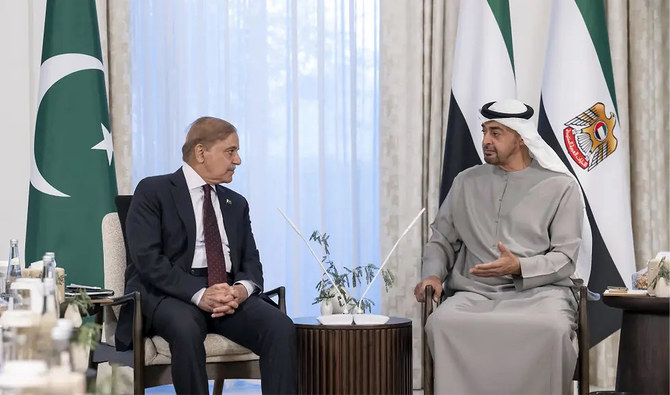
- The storm first hit Oman over the weekend, before pounding the UAE on Tuesday with its heaviest rains in 75 years
- PM Shehbaz Sharif telephoned the UAE president, called for collective actions after rains kill over 70 people in Pakistan
ISLAMABAD: Pakistan Prime Minister Shehbaz Sharif on Friday telephoned United Arab Emirates (UAE) President Sheikh Mohamed bin Zayed Al-Nahyan and urged collaboration between the two countries to tackle impacts of climate change, Pakistani state media reported, days record-breaking rains hit the Gulf nation.
The United Arab Emirates was still grappling on Friday with the aftermath of a record-breaking storm this week, with the main road connecting Dubai, the most populous emirate, with Abu Dhabi partially closed for traffic.
The storm first hit Oman over the weekend, killing at least 20 people, before pounding the UAE on Tuesday with its heaviest rains in 75 years of records. Scientists blame increasingly common extreme weather events, such as the rains in UAE and Oman, on human-led global warming.
During the telephonic conversation, Sharif lauded the UAE president for his “outstanding leadership qualities” and strong commitment to ensure the welfare of the Emirati people, the state-run APP news agency reported.
“The prime minister said that Pakistan had also witnessed heavy rains in recent days, resulting in loss of many precious lives,” the report read.
“He called for collective actions to combat the challenge of climate change and suggested that both countries strengthen their collaboration in the field.”
Pakistan has been prone to natural disasters and consistently ranks among one of the most adversely affected countries due to the effects of climate change. Torrential rains have killed more than 70 people in the South Asian country this month, according to authorities.
The UAE president appreciated the prime minister’s good wishes and reciprocated the warm sentiments for the people affected from rains and flooding in Pakistan, according to the APP report.
“Both leaders reaffirmed their commitment to enhance bilateral cooperation in multifaceted areas,” it added.
Over 600 IT firms, 100 foreigners attend ITCN tech conference in Lahore
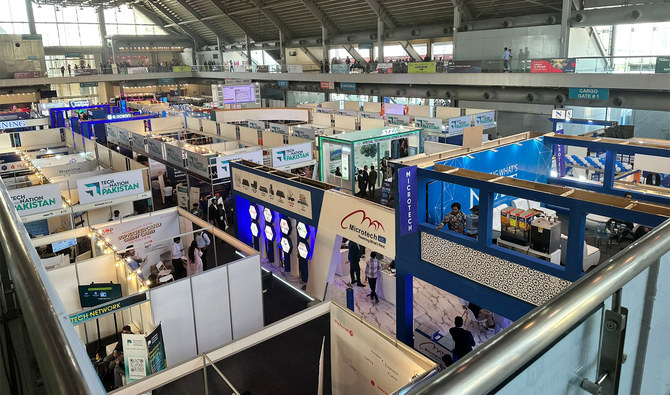
- The three-day exhibition is set to fetch nearly $500 million investment from a dozen countries
- The companies participating in the expo include Microsoft, Inbox, Lenovo, HP, NetSol and Dell
ISLAMABAD: More than 600 IT companies, 55,000 participants, and around a hundred foreign delegates are attending an ongoing 24th edition of the Information Technology Commerce Network (ITCN) Asia Conference in the eastern Pakistani city of Lahore, Pakistani state media reported on Friday, citing officials.
The main sessions at the three-day tech event include the Artificial Intelligence Summit, Global Security Symposium, Gaming and Scholars Roundtable, Investor Summit, Freelancer Summit, Made in Pakistan Roundtable Conference.
State Minister for Information Technology and Telecommunication Shaza Fatima Khawaja said the objective of the event was to highlight the expertise and products of Pakistan’s IT sector at the international level.
“Sixty eight percent of Pakistan’s population consists of young people and IT is a field that has a lot of opportunities available for them,” she told Radio Pakistan broadcaster. “The government’s vision is to bring as much skill training as possible for the youth in the IT sector.”
Khawaja said the government would provide cheap loans to the IT sector so that freelancers could thrive.
“The government has started the Industry Academia Bridge Program under which IT students in universities can collaborate with the private sector to get practical training while studying and secure their jobs,” she added.
Speaking on the opening day of the event at Lahore’s Expo Center on Friday, Khawaja said it was an honor for Pakistan to be a founding partner of the Digital Cooperation Organization, a global multilateral body launched in November 2020 to help enable digital prosperity for all, and a testimony to the country’s readiness to be one of the leading stakeholders in the global IT ecosystem.
“Pakistan’s digital progress and its position as a global stakeholder is underscored by its vibrant youth as Pakistan produces 10,000 IT graduates every year,” she said.
“Together we will make Pakistan an IT hub as IT is the key toward growth of all sectors.”
A delegation of international investors belonging to 12 different countries is participating in the event that is expected to attract around $500 million investment, according to Pakistani state media.
Renowned international and national technology companies, including Microsoft, Inbox, Red Hat, TP-Link, Lenovo, HP, NetSol, Abacus and Dell, are participating in the three-day exhibition.
The event is being jointly supported by the Pakistani Ministry of Information Technology and Telecommunication, Pakistan Telecommunication Authority, Special Investment Facilitation Council (SIFC), Pakistan Software Export Board and Pakistan Software Houses Association.
Pakistan stocks close at record high amid IMF talks, tensions in Middle East
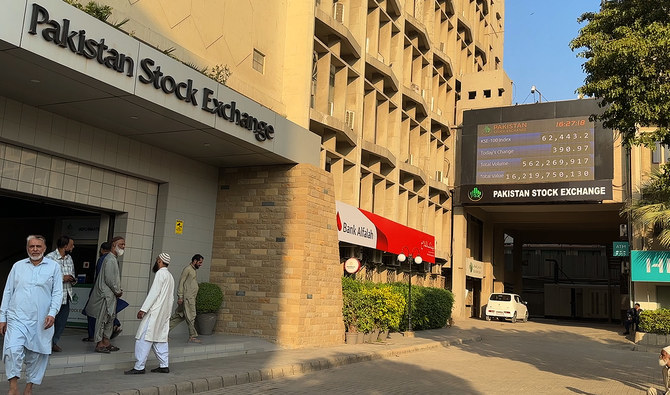
- The benchmark KSE-100 index surged by 647 points after morning trading hiccups due to reports of Israel’s attack on Iran
- Pakistani analysts say escalating tensions in Middle East will impact supply chain and increase import bill for Pakistan
KARACHI: Pakistan’s stock market recorded on Friday its highest-ever closing at 70,909 points, stock brokers and analysts said, attributing it to ongoing talks with the International Monetary Fund (IMF), but cautioning about potential economic impact of Israel-Iran tensions in the Middle East.
Explosions were heard in Iranian city of Isfahan on Friday that were described as an Israeli attack by western media. However, Tehran has not officially confirmed the development as its response remains muted.
The Pakistan Stock Exchange witnessed some nervousness in the morning trading session, when news of Israel’s attack on Iran came in. But despite the development, the benchmark KSE-100 index surged by 647 points to close at 70,909 points.
“When news of the attack on Iran came this morning, its impact was seen in the Asian and European markets at one point,” Shehryar Butt, portfolio manager at the Karachi-based Darson Securities, told Arab News.
“Nikkei saw a decline of more than a thousand points, but despite this, the Pakistan Stock Exchange performed much better.”
The Pakistani bourse has recently been trading at record highs amid positive sentiment prevailing among investors due to hopes of the country’s successful talks with the IMF.
“The basic reason for this is that Pakistan is currently in the IMF program, and very serious discussions are taking place in Washington at this time,” Butt said.
Pakistan’s finance minister, Muhammad Aurangzeb, is currently in Washington to hold talks with IMF officials for a new long-term loan program as Pakistan’s current $3 billion program is due to expire this month. The finance minister has expressed his hopes that the outline of the new program will be agreed next month.
Pakistan is expected to demand a loan size of around $7 billion but Jihad Azour, the IMF Middle East and Central Asia Director, said on Wednesday the reform package was more important than the size of the program.
“I would say the package of reform is now more important than the size of the program because we saw recently that the right measures provided the right response,” Azour said at a press briefing.
The surge in global oil prices amid geo political tensions and the Pakistani rupee’s recovery played “a catalyst role in Friday’s record close,” according to Ahsan Mehanti, CEO of the Arif Habib Corporation.
Though Pakistan’s market downplayed the Middle East tensions, but analysts said if the situation escalated, it would disrupt supply chain and impact Pakistan’s economy.
“The conflict between Iran and Israel will affect the Pakistani economy, quite a negative effect will be seen on the Pakistani economy because immediately after that, we saw geo-political situation worsening and oil started to rise,” Butt said, adding the rising global oil prices would impact Pakistan’s import bill.
Pakistan has imported petroleum products worth $12 billion during the July-March period of the current fiscal year, including $3.9 billion worth of crude oil and 2.9 billion worth of liquefied natural gas (LNG), according to official data.
Butt feared that if the situation persisted, then the attention of Saudi Arabia would also be drawn to the Middle East and the investment commitments made by the Kingdom with Pakistan could be delayed.
Haroon Sharif, an economist and former chairman of the Pakistan Board of Investment, said if the tensions in the Middle East escalated, their first impact would be on the stock market as foreign investors would like to shift their capital to safer markets.
“Another impact would be oil price escalation, hitting Pakistan’s trade deficit and traveling and cargo price would also escalate, increasing the cost of doing business,” Sharif said, adding that investors would hold their future expansion and investment plans till situation becomes stable.
Husain Haqqani, a former Pakistani ambassador to the United States and scholar at Washington DC’s Hudson Institute, said a prolonged conflict between Iran and Israel would increase uncertainty and instability across the Middle East.
“If Iran’s drone and missile attack on Israel was meant to show Iran’s reach, Israel has demonstrated its ability to strike deep inside Iran,” Haqqani told Arab News.
“Iran has several proxies that it can use while Israel has tremendous military and intelligence capabilities. Leaders of both countries have domestic political reasons to not be forgiving toward one another.”
Haqqani said the US would likely restrain Israel, while Iran would be constrained by its limited capability.
“After all, even after attacking with hundreds of missiles and drones, Iran was unable to cause real damage on ground in Israel,” he added.










